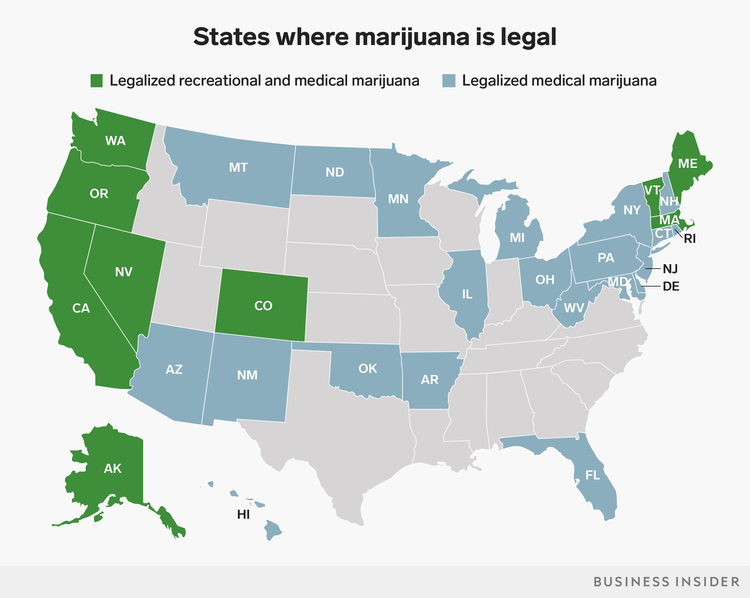And with a big F U to LePage....whose antidemocratic actions as the previous Governor are completely and utterly contemptible, IMO.
With Mills’ signature, Maine finally has rules for recreational marijuana market
Maine's adult-use marijuana industry will have the strictest residency rules in the nation.
Gov. Janet Mills signed a
marijuana rules bill Thursday that puts Maine on track to launch recreational sales in March, 2½ years after voters approved legalization at the ballot box.
The governor endorsed
regulations that spell out how Mainers can grow, buy, and sell marijuana without a public bill-signing ceremony. The rules, which go into effect in September, make Maine the eighth state in the nation to have a clear path to a fully legal commercial adult-use cannabis market.
Related Headlines
“Over the course of the last several months, my administration has worked quickly to implement the law regarding Maine’s adult-use recreational marijuana market as Maine voters asked the state to do 2½ years ago,” Mills said. “The rule development demonstrates what can be accomplished when state government works with lawmakers, industry stakeholders and the public to accomplish a shared goal.”
“With this law, we are one step closer to honoring the will of Maine voters,” Mills said.
The law will take effect 90 days from when the Legislature adjourned on June 20.
But the
state regulations are not the only rules that will apply to Maine adult-use marijuana businesses. The recreational law adopted last year allows cities and towns to decide if they will opt into the market, and set local rules. So far, only about 15 of Maine’s 455 municipalities have
opted in.
The Maine Office of Marijuana Policy worked with seven different state agencies, the growing marijuana industry and two different nationally known cannabis consultants, Freedman and Koski of Colorado and BOTEC Analysis of Los Angeles, to develop the adult-use rules.
Related
Who can sell pot, how they can sell it, and how much they can sell: Rules at a glance
“The Office of Marijuana Policy has set several ambitious timelines since being established in February, and we are proud to have been able to meet all of them,” said Erik Gundersen, director of the Office of Marijuana Policy. “We have drafted these rules with a view toward keeping the public’s health and safety at the forefront.”
While
more relaxed than state regulators had originally wanted, the final version of the new recreational rules still has the most demanding residency requirements of any legal marijuana market in the nation, according to
Andrew Freedman, a Colorado consultant who helped draft Maine’s rules.
“A few other legalized states started with residency requirements, like Colorado and Oregon, but changed them or repealed them in time,” Freedman said. “It can be hard to get legitimate capital investment in the market because friends and family quickly run out and they can’t get traditional bank loans.”
The regulations signed by Mills allow only people who have lived in Maine for four years to seek a license to grow or sell marijuana or make marijuana products or own a majority interest in the business. But state regulators dropped wording that limited out-of-state control of Maine marijuana businesses.
The rules were relaxed after the state’s biggest medical marijuana business, Wellness Connection of Maine,
threatened to sue, saying that the investment limits would bar it from the adult-use market. It has a financial relationship with Acreage Holdings of New York, one of the largest cannabis companies in the nation.
Related
Maine’s biggest marijuana company threatens to sue state if it’s shut out of recreational market
According to Freedman, only Washington state’s local licensing protections can compare to Maine’s new regulations. Washington requires everyone in its marijuana industry to be a resident, but its definition of resident is much easier to meet – six months of living in-state compared to Maine’s four years.
Though Maine has embraced residency requirements for economic reasons, wanting to create a state market that benefits residents and keeps marijuana profits from heading out of state, Colorado, the first U.S. state to legalize adult-use marijuana, initially saw residency as a way to deter black market diversion, he said.
After all, the marijuana industry was a high-risk investment in 2014, with no one sure whether those who bankrolled a marijuana business would end up in a federal prison, recalled Freedman, who served as that state’s first top marijuana regulator. But as the market boomed, out-of-state investors wanted in.
State regulators could not keep up with increasingly complex corporate structures created by out-of-state financial interests to keep the money flowing in and out of Colorado, Freedman said. Eventually, the state relaxed its residency rules, and now even publicly traded marijuana companies can operate there.
In 2016, two years after market launch, Oregon repealed its regulation that required 51 percent of a state-licensed marijuana business to be owned by somebody who had lived there for at least two years after local entrepreneurs claimed they couldn’t find enough in-state investment.
After seeing Colorado regulators struggle to pierce the corporate veil, and Oregon struggle to find investor capital, California and Nevada launched adult-use markets without resident perks. In Massachusetts, only those seeking preferential craft, cooperative or minority-owned business licenses must be residents.
Maine’s new adult-use marijuana rules were folded together with a bill, L.D. 719, that included a few statutory changes to enable the rollout of recreational marijuana, including a provision that allows marijuana to be legally added to food, thus enabling the profitable edibles market to launch.
Maine’s path to recreational sales has been long, because of the opposition of Mills’ Republican predecessor, Paul LePage. Since her election to the Blaine House, Mills has acted swiftly to launch adult-use sales, creating an Office of Marijuana Policy in her first month that produced draft regulations in just under three months.
During her campaign last year, Mills had a
“test it, track it and tax it” philosophy about adult-use sales. She noted the industry’s potential to grow the state economy, end the outdated war on drugs and create jobs. Analysts now say the industry could employ as many as 5,400 people upon maturity.
“I’m not opposed to adult-use recreational marijuana, not opposed to it at all,” Mills said at a governor’s debate in September 2018 in Lewiston. “You’ve got to do three things with marijuana, cannabis: test it, track it and tax it.”
But some marijuana advocates attribute her action to political pragmatism more than authentic support. They remember then-Attorney General Mills criticizing the wording of the cannabis ballot question right before the November 2016 referendum and implying that it might enable children to legally possess pot.
“Regardless of whether marijuana should be legal (Maine decriminalized possession of small amounts 40 years ago), the question is whether this 30-page bill should become law,” Mills wrote in an
op-ed in the Portland Press Herald in October 2016. “I ask every citizen to read the entire bill before voting.”
Related
Another View: Regulating cannabis like alcohol is not what Question 1 does, Maine AG Mills says
Her communications director, Scott Ogden, did not reply to a question about how Mills voted on adult-use legalization.
A legalization campaign organizer, David Boyer of the Marijuana Policy Project, remembers Mills’ October legal interpretation as a blow at the time, but said he believes that Mills’ opinion of marijuana legalization, like the rest of the country and even Maine, has evolved over the last three years.
“When this passed in 2016, marijuana reform efforts were different,”Boyer said. “Like most Americans, I think the governor realized that prohibition has failed. Mainers are safer when marijuana is behind the counter and regulated rather than sold by drug dealers.”
Boyer said he appreciates her administration’s quick work of finishing the rules and launching the market.
Maine was one of four states to legalize recreational marijuana in 2016, but it will be the last of those to record its first legal adult-use sale. California and Nevada recorded nearly $3.1 billion in adult-use sales in their first year. Massachusetts recorded $138.9 million in sales in its first six months.
It is unclear how much tax revenue Maine may have lost to Massachusetts, which recorded its first sales last November. Bay State budget officials are banking on $22 million in adult-use sales in the first 3½ months of the 2019-20 fiscal year, and $84 million in fiscal year 2020-21.
National consultants predict the Maine market will be bigger, clocking in at $107 million in 2020.
Consultants peg Maine’s in-state recreational marijuana consumer base at about 173,000 people, or 13 percent of Maine’s population. They estimate 25 to 35 percent of adult Mainers have used marijuana at least once in the last six months.
In the early days of the market, Maine consumers should expect to see recreational marijuana prices go up while retailers win licenses and testing labs that must sign off on all recreational products open their doors, consultants say. Prices will peak about 18 months after launch and then begin to fall.
Right now, an ounce of smokeable medical cannabis generally costs $150 to $250, depending on the kind of marijuana, the source and if the purchase is made at a store or dispensary or is delivered. Black market recreational marijuana is readily available for about the same price.

